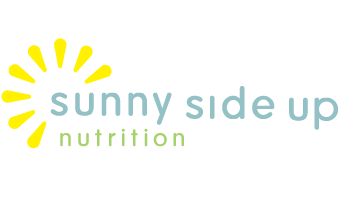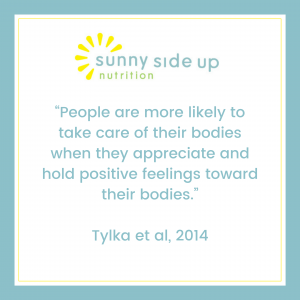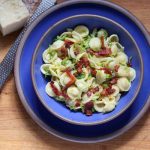Valentine’s Day is the day of love! I think of red roses, chocolate and conversation hearts. Valentine’s Day reminds me of card exchanges in elementary school or feeling hopeful for a special, romantic evening out. It’s a day that we show love or care for other people, through gifts, gestures, or kind written words. Valentine's Day is about connection with those you love. As Valentine’s Day approaches, I wanted to take the time to stop and consider the importance (and health aspects) of showing love, care and connection for our own bodies.

Love IS Healthy.
My 6 year will ask me often if the food she is eating is "healthy."
"Is toast healthy?"
"Is ice cream healthy?"
"Is an omelet healthy?"
In her pre-K classroom, she was taught about "healthy" and "unhealthy" foods and this has led to lots of conversation at our house. She likes to test me and see what I am going to say about the food she is eating. Vivian is trying to figure out this world view her mother has that is different from her wonderful and loved teachers. I like to tell her about all different food scenarios that are "healthy," regardless of what is being eaten. For example, a person sitting and eating a dessert with a loved one and feeling safe, calm and happy is so healthy.
Today she asked me, "Mama, Is love healthy?"
With that one question, I felt like maybe she "got it." She "got" what I'm slowing exposing her to, that "health" isn't necessarily in the nutrients you eat, but also in the emotions you feel. She learns at school that certain foods are "healthy," and other foods are "not," but what about the shame and guilt these messages evoke? What about the loss of connection a person my experience if they don't eat the "unhealthy" food. What about the loss of connection with their own body, if they follow these arbitrary outside rules?
Diet Culture is Defining “Health”
Diet culture, and the hatred of bodies that is inherent to diet culture, greatly influences our beliefs about health. Vivian is taught in school one food is "healthy," while another is not. Popular culture tells us it's "healthy" to lose weight or look a certain way. We’re told that "healthy" behaviors are often based on ignoring what our bodies are telling us and sometimes even doing things that feel badly or hurt our bodies. Many healthcare providers use shame or criticism as a way to "motivate" patients to be "healthier." We’re told it's "healthy" to burn, shred or push our body to the limit, regardless of pain or the messages our bodies are giving us.
Love and Care
Instead of diet culture defining health, we need to focus on what true health is. This is where Valentine's Day comes in. Does ignoring what our bodies are telling us, and instead prescribing to external rules, sound like a supportive, lovely relationship with your body? Love, care and appreciation are all important for a healthy relationship. Research shows that when people have positive feelings about their bodies, they are more likely to take care of their body (Tylka et al, 2014). We have it all wrong, we need to be loving, caring and appreciating our bodies. THAT is healthy.
What if it’s “healthy” to:
- Listen to what your body wants to eat, whether that's a big salad or big plate of pasta, and eat it. Rather than saying it’s “healthy” to only eat X, Y, and Z.
- Share a special meal with a loved one, regardless of what specifically is eaten.
- Take a rest day, because your body is tired or injured.
- Eat the special dessert, because it reminds you of your mother and brings back fond memories. Rather than skipping the desert because it’s not “healthy.
LOVE is healthy.
How can we redefine health for ourselves? What can you do for your body this Valentine’s Day to show yourself love and care?
Tylka, TL, Annunziato, RA, Burgard, S. Daníelsdóttir, S, Shuman, E, Davis, C, Calogero, RM. (2014) The Weight-Inclusive versus Weight-Normative Approach to Health: Evaluating the Evidence for Prioritizing Well-Being over Weight Loss" Journal of Obesity, vol. 2014, Article ID 983495, 18 pages. https://doi.org/10.1155/2014/983495





Leave a Reply